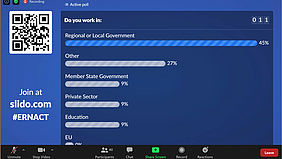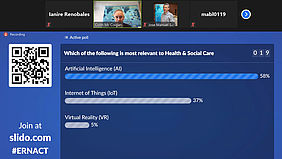DISTINCT lead partner, the ERNACT network, has organised a workshop on ‘Disruptive Digital Technology & Cohesion Policy’ during the European Week of Regions and Cities. The session brought the opportunity to engage with the audience and receive some valuable feedback for our recently launched project.
The workshop was targeted at public service providers and digital tech suppliers (universities, research centres, companies...) with the aim to identify some solutions and challenges related to the role and use of disruptive technologies. Over 40 professionals across Europe (from Spain, France, Ireland, UK, Iceland, Sweden, Germany, Austria, Czech Republic, Denmark, The Netherlands...) joined the session and most of the participants expressed that they work in Local or Regional Government and Education.
Trying to make the session as interactive as possible, ERNACT invited all the attendees to use the Slido tool and answer some questions based on the topics proposed by speakers:
- Disruptive technologies, looking forward in the Interreg Northern Periphery and Arctic Programme;
- Artificial Intelligence (AI) In Government services;
- The use of technologies for public services automation;
- Potential of disruptive technologies for public services provision in rural areas;
- The role of Virtual Reality (VR) / Augmented Reality (AR) in public services provision
Asked about their personal interests, participants chose 'Digital services for citizens', 'Research and innovation in SMEs' and 'Government services', closely followed by another topic: 'SME products, services and processes'. Thanks to their participation the hosting organisation could conclude the following ideas:
ERNACT asked if attendees could have an idea for the use of AI in the public sector or Government and our lead partner received many answers, among others: combine Internet of Things (IoT) sensor and other sensor platforms to build up flood management predictive services; smart cities; clean energies: sea waves and tides, solar, geothermal, etc; simplify Reporting, 24 hours service for municipal information, AI in rural areas, analysing how procedures can be made more user friendly, booking appointments online, planning applications...
In reference to their concerns about using Artificial Intelligence, %27 expressed that they don't have any concerns. However, 41% made a reference to the help diagnose in complex mental conditions (e.g., dementia) and another 23% mentioned the decrease of visits by medical staff to patients at home.
Asking about which of the following is most relevant to Health & Social Care: Virtual Reality (VR), Internet of Things (IoT) or Artificial Intelligence (AI), 57% of the participants chose the third option. Regarding Training, 81% of the attendees selected Virtual Reality rather than Internet of Things and Artificial Intelligence. Finally, in reference to which of the three options is the most relevant to Environmental Services, the most preferred option was Internet of Things with the 81% of the votes, followed by the Artificial Intelligence and the Virtual Reality. With the last question of the quiz, ERNACT wanted to find out which of the following public service areas would benefit most from AR/VR and they got the following responses: the tourism sector followed by citizens training and health.


